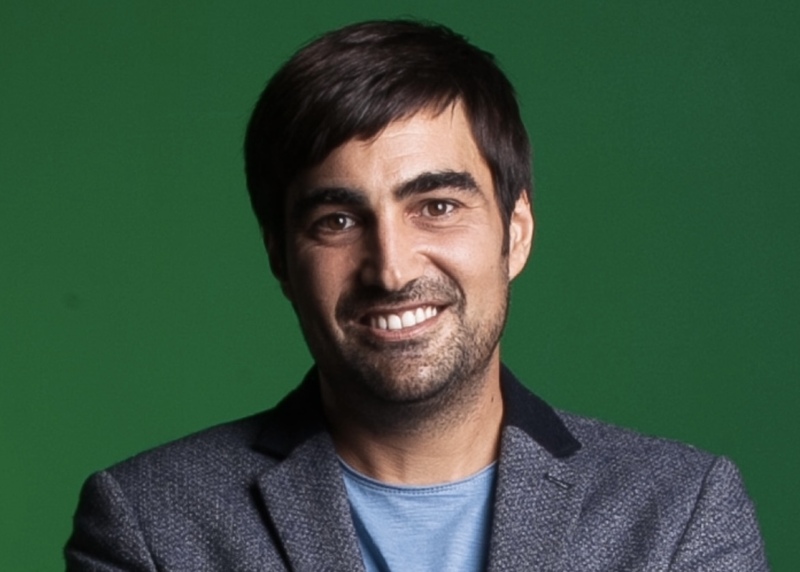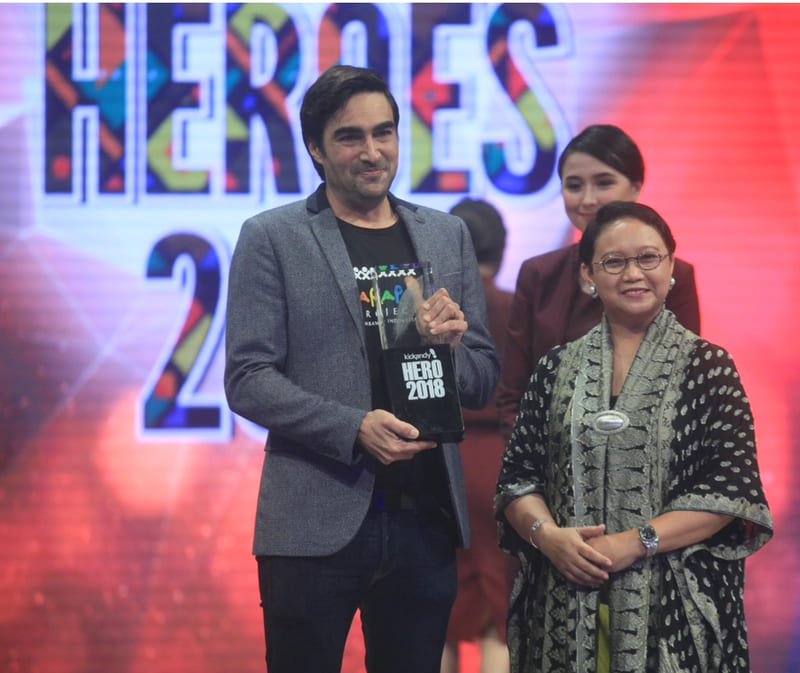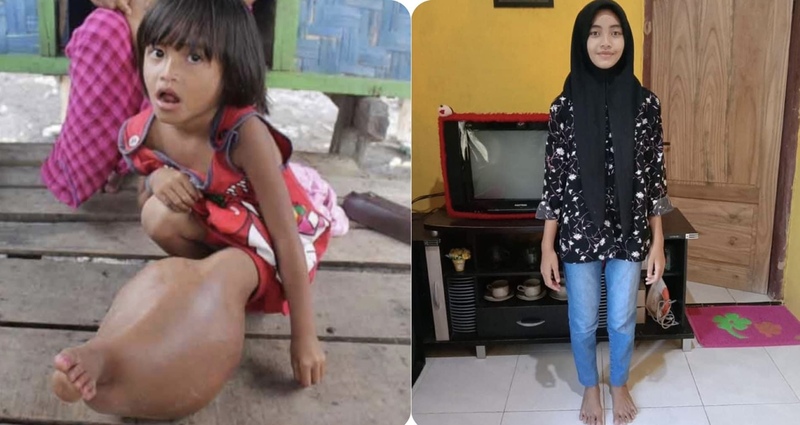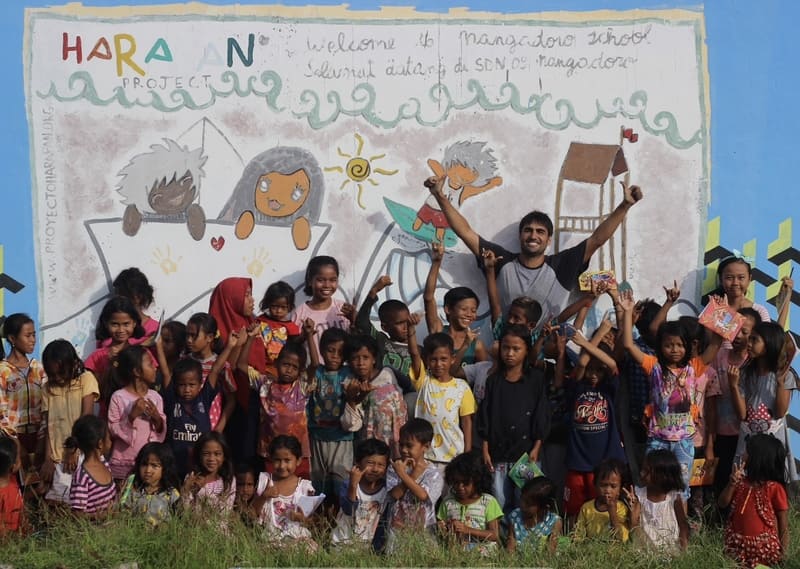A journey of compassion, challenges and triumphs with Carlos Ferrándiz, the head of Harapan Project.
In this exclusive interview, we delve into the motivations, challenges and triumphs that define the humanitarian initiatives of Harapan Project, an organisation born out of a commitment to bring hope to those in need. Join Indonesia Expat as we unravel the extraordinary narrative of Carlos Ferrándiz, a beacon of inspiration in the realm of social impact.
Hi, Carlos. Please tell us a little bit about yourself.
My name is Carlos Ferrándiz, I was born in 1980 in Barcelona. I used to be a lawyer, working for eight years in a large law firm (PwC), with a professional future that would be enviable for many. Since I was a child, my parents have instilled in me the importance of helping others, taking me since I was very little to carry out humanitarian work, particularly in soup kitchens and in residences for the physically and mentally handicapped.
We’ve heard that you’re running a social organisation called “Harapan Project”. What can you tell us about it?
Harapan Project is the humanitarian project that I created in 2010 and I have been running it since then, when I decided to leave my job as a lawyer in Spain, my family and my friends to move to Indonesia and be able to dedicate myself fully to the Harapan Project (Harapan means “hope” in Indonesian).
What was the motivation behind this organisation? Furthermore, how has the project evolved over the years?
In 2005 I made my first holiday trip to Indonesia. On this trip, tired of the number of tourists on the island of Bali, I decided to travel to Sumbawa, West Nusa Tenggara. When I arrived in Sumbawa, I was very shocked by the extreme poverty that I saw, it seems like a totally different country compared to Bali.
A few days later, a boy wanted to communicate with me, I asked him if he spoke English, and he replied “Teacher no good”. I told him that the next day I was going to teach him English and that he should tell his friends. The next day, I went to the place agreed, with a half-broken blackboard and with my books and dictionary. You can’t imagine my surprise when I saw around 200 people waiting for me. At that moment I understood the enormous need they had and that no one had ever offered them a helping hand. At that moment the Harapan Project was born.
Once back in Barcelona, I continued with my job as a lawyer, but without being able to forget those people. I felt that they really needed me, and that if it was not me, nobody would help them. So, I began to devise the Harapan Project, creating my NGO and designing a humanitarian project.
In 2010, I quit my job as a lawyer and moved to Sumbawa, where I have been living for the last 14 years, dedicating my life totally to Harapan Project.
Can you share with us the frequent challenges and rewards of running “Harapan Project”?
Many people think that Harapan Project is a big organisation, but that is not the truth. It is a small NGO with a low annual budget, and we have a big difficulty in raising donations.
In the beginning everything was very difficult, I was alone in the project, and was not able to have a team, as we didn’t have funds. I spent six years running everything by myself. In the morning I was busy bringing kids to hospitals and, in the afternoon, teaching at schools. Now we have a proper team with seven employees and, in 2020, we were able to build our own centre, which serves as a base camp for my team and where we provide free accommodation to long-term volunteers.
In many moments, I felt like giving up, but the immense love that the local population shows me every day makes me keep strong and continue fighting to fulfill my dream, to offer them a better future.
Regarding rewards, I have received many awards, perhaps the most important being the one awarded in 2018 by the Minister of Foreign Affairs of Indonesia, Mrs. Retno Marsudi, who gave me the “Hero 2018” award on the Kick Andy TV show. But, for me, the greatest achievements and rewards are to see the sick children that we have helped and now they are in perfect health.
How does “Harapan Project” care for children with specific medical or psychological needs?
We carry out many programs:
- Medical: We give free medical assistance to all the sick children in the Hu’u district and implement other medical programs aimed at the entire population;
- Educational and Sports: We teach at five local primary schools and we also carry out many sports programs (i.e., football, surfing and other sports);
- Organic Agriculture school: We have set up a school of organic agriculture to teach the local population organic gardening skills and promote that every family grow their own garden;
- Youth Empowering: We sponsor youth to get formation during five-month stays in the best agriculture schools in Indonesia, in order to learn organic and hydroponic agriculture, English, countability and administration, and IT skills;
- Social Assistance: We help people in situations of special need in order to improve their living conditions and meet their basic needs.

Can you share with us one of the success stories about children who have benefited from “Harapan Project”?
One of the most difficult cases that I have encountered is the case of little Deby, a 6-year-old girl with a huge tumour in her leg. Deby had never left her house as her parents were embarrassed that the rest of the village saw her condition. As soon as I heard her story, I went to look for her and convinced her father to take her to the hospital. We went to Dompu Hospital, but the doctors told us that the only thing they could do was to amputate her leg. I refused and took her to Bali. We spent three months going around hospitals in Indonesia, where we always received the same answer, that there was no other solution than to amputate her leg – until we found a doctor, Dr. Andatusta, who gave us hope. The surgery was carried out and it was a complete success, and Deby was finally able to keep her leg. She is now 15 years old in perfect health, and is a brilliant student at school.
So far, how has “Harapan Project” positively impacted the local and nearby community?
During all these years we have carried out many programs that have benefited and have had a true impact on the local population. Since 2010, in addition to improving the education of children in Hu’u, we have helped more than 400 sick children to receive surgical operations, and more than 1,500 children to receive medical treatment. In addition, we have carried out many programs aimed at the entire population, such as the program for victims of the terrible floods that the Hu’u community suffered in 2021, where 126 families completely lost their homes and all their belongings. We donated goods with a value of 56,000 Euro, including clothes, beds, two tons of groceries, and all the needed equipment for cooking which included gas stoves. Also, during the COVID pandemic, Harapan Project helped the local government and the local population by providing medical equipment, and medical and sanitary items with a value of 92,000 Euro. The situation at the local hospital and health centres was critical; they were completely overloaded and they lacked the necessary materials for their work.
Does “Harapan Project” consistently open for volunteers? If so, what kinds of activities do the volunteers engage in?
We do have a volunteer program, collaborating with universities from Indonesia and other countries, in which we receive long-term volunteers, giving them free shelter and food.
What’s next for “Harapan Project”?
We still have a long way to go and we want to implement many new programs. Among other programs, we want to create a livestock program to teach the population how to make dairy products, such as cheese, kefir, and yoghurt. We would also like to be able to create water wells in the villages and supply the local population with drinking water.
Last but not least, how can our readers reach you and “Harapan Project”?
If readers want to know more about our work or contact us, they can visit our website www.harapanproject.org or our Instagram and Facebook: @harapanproject.




